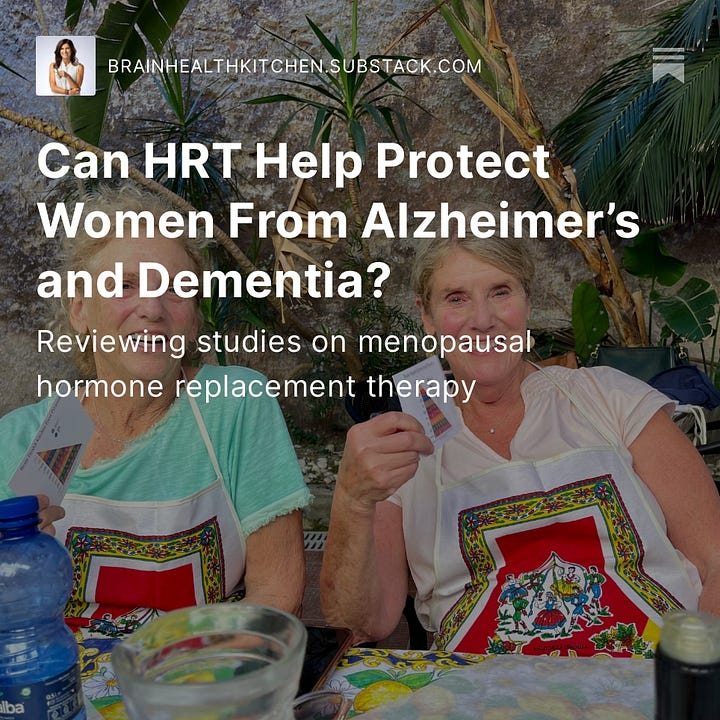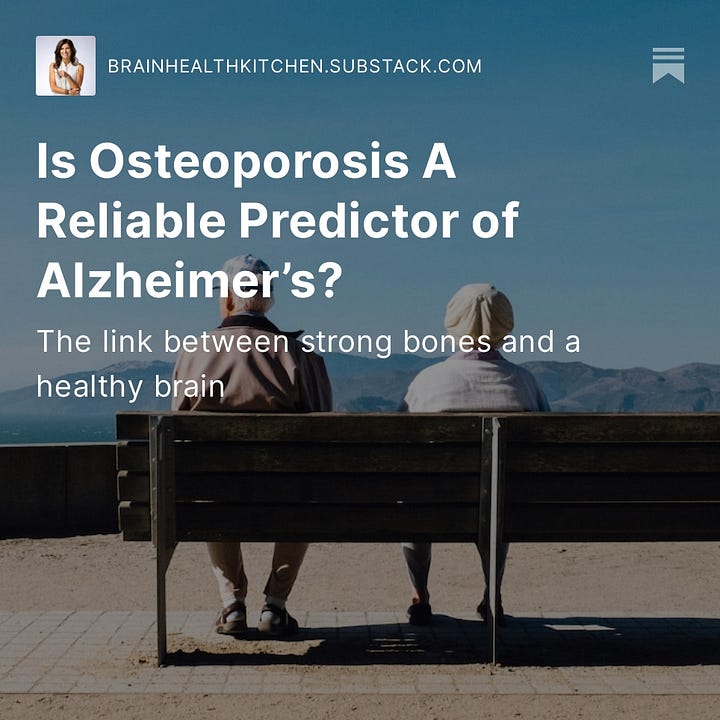How To Talk To Your Doctor About Brain Health
5 things to have checked + a guide to specialized tests
Hello, brain health ambassadors! As I started writing to you about this topic, my mind flashed back to a newspaper piece I wrote over 25 years ago. It was about being prepared for the annual wellness exam. In the article, I encouraged women to approach the medical practitioner as a partner in care, with a list of talking points in hand and pertinent tests and family history at the ready. Back then, nobody knew what “gaslighting” meant, but it was all too common in women’s health. Patriarchal attitudes were the norm and women’s concerns were outright ignored.
Now, hopefully, women are having better experiences with their health care practitioners. Still, it’s a fact that many women—especially women of color—are dismissed in health care environments. And I’m sure this happens to men, too. I cannot overemphasize how important it is to be your own advocate. And this means being prepared to bring up brain health at the doctor’s office.
Everyone needs a brain health care plan in place—and the earlier you create it, the better.
If you’ve been reading my book or this newsletter, you already know Alzheimer’s starts in the brain 20 to 30 years before the first symptoms. You already know that lifestyle and nutrition are key factors in fending it off. We’ve gone into the list of modifiable risk factors that are well-documented, as well as the new ones, like hearing loss, that have emerged.
Chances are, your physician or other health care provider won’t bring it up first. Brain health awareness is largely driven by people with first-hand experience of dementia seeking information and advice. It’s not that your physician doesn’t care. It just may not be on his or her radar yet. One day, I hope talking about strategies for preventing neurodegenerative diseases will be routine. For now, it’s up to you to get the conversation started.
This first newsletter of the month is always free. Everyone is welcome to share.
Nearly half of all Americans over 45 are missing an opportunity to prevent dementia
This 2022 CDC report identified the two most common modifiable risk factors for Alzheimer’s disease in adults 45 and older: high blood pressure and not getting enough aerobic exercise. In addition, more than 35% of Americans are overweight, 19% have diabetes, 18% have depression that goes untreated, 15% smoke, 11% have hearing loss, and 10% are binge drinkers.
Below, you’ll find:
Some helpful tips for finding the right provider
5 tests to get plus specialized ones to consider
Questions to help you prepare to discuss brain health with your doctor
Finding the right primary care provider
This could be with your family physician, ob/gyn, or another primary care practitioner, such as a nurse practitioner. Most people don’t see a neurologist unless they already have a problem, but if you are seeing one for something else, such as migraines, then it’s appropriate to bring up brain health prevention, too.
Make a list of what you want to cover
Most physicians really appreciate it when you are prepared. Having a list can help keep you on track, especially if these visits tend to cause anxiety. Be realistic about the length and scope of your list, though. Pulling out a multi-page list will probably give your practitioner anxiety! Prioritize with the most important items on top and know that a long list may require an additional visit. Plus, it may be a good idea to bring a trusted partner or friend who can listen and take notes.
Get your story straight
Part of being prepared means knowing your personal medical history and your family history. When did you go through menopause? Did your grandmother have Alzheimer’s or another dementia, such as Lewy Body, vascular, or frontotemporal lobe syndrome? When your father was hospitalized for chest pains, was he found to have coronary artery disease or something else? What medications and supplements do you take? Details like this matter to your provider.
Brain health conversation starters
Ask about brain health right at the beginning of the visit, ideally when you are asked why you are there. Here are a few ways to broach the topic:
I’m here for an annual exam, but I also want to talk about taking care of my brain. My grandmother has Alzheimer’s, and I have a few other risk factors, and I want to do everything I can to prevent it.
I am experiencing some mild memory lapses, which may be because I’m not getting enough sleep. I want to talk about this and also come up with a long term plan to keep my brain healthy.
I’m concerned about Parkinson’s because my mother had it. I also want to talk about what I can do now to reduce my risk of this and other brain diseases. (Prep by reading the latest about Parkinson’s here.)
Find out where you stand with these 5 biomarkers
A biomarker is just a fancy word for something about your health that can be measured, like blood pressure or cholesterol. Many of the studies we have about preventing Alzheimer’s zero in on optimizing these factors at mid-life.
Blood pressure. You may be told that your blood pressure is fine. That’s great, but it’s better to know your numbers. Ask for the actual reading and also what it was over the last several visits. The top number should be consistently under 130 and the bottom number should be under 80.
Consider tracking your own blood pressure. Blood pressure tends to be higher at the doctor’s office for many reasons. The best way to track your blood pressure is to purchase a home blood pressure monitor, check it every few days, and keep a written log. If you are already doing this, be sure to bring the log with you to your appointment. Read more about blood pressure here.
Cholesterol. An elevated LDL at midlife has been linked to an increased risk of Alzheimer’s ten or more years later. Conversely, low levels of LDL (under <70 mg/dL) have been associated with slower rates of cognitive decline over 20 years. And, LDLs under 55 mg/dL translate to even better brain health.
A full lipid panel is a great place to start to assess your risk for atherosclerotic cardiovascular disease (ASCVD), which in turn informs your risk for dementia. This gives you a breakdown of these cholesterol biomarkers: high density lipoprotein (HDL), low density lipoprotein (LDL-C), triglycerides (TG), and total cholesterol (TC). Target LDL-C: <100 mg/dL or <70 mg/dL for high risk.
Apo-B or Apolipoprotein B-100 is a blood test that may be even more sensitive than a lipid panel to tell you about your risk for ASCVD. It measures the protein that carries the cholesterol (LDL and VLDL) that builds up in arteries causing harmful plaques. Some healthcare providers believe an Apo B test is more accurate than a lipid panel (which also measures “good” cholesterol like HDL) to estimate cardiovascular disease risk. Target Apo-B: <80 mg/dL.
lp(a) or “LP little A” is yet another test that detects the genetically influenced type of cholesterol that’s highly linked to blocking arteries: LDL-C. Checked just once in your life, this helps determine if you have a genetic red flag for getting ASCVD, also a risk factor for Alzheimer’s and vascular dementia. Target lp(a): <75 mmol/L.
Hearing test. Hearing loss is a well-documented risk factor for dementia later in life. And, thanks to data from the ACHIEVE trial published this year, correcting hearing loss (by using a hearing aid, for example) brings risk back down. This makes a strong argument for getting a screening for hearing loss at midlife and then periodically depending on symptoms. Ask your practitioner to order the test, or look into getting one someplace like Walmart or online.
Screening for diabetes. People living with diabetes have a two-fold increased risk of Alzheimer’s. Even pre-diabetes, or “borderline” diabetes, has been shown to increase dementia risk. If you are at risk for diabetes (because you had gestational diabetes while pregnant, for example, are overweight or have family history of type 2 diabetes), it’s worth asking for a more sensitive test, such as a an oral glucose tolerance test.
Fasting blood glucose is just a snapshot in time influenced by what you may have eaten the day before. Persistently elevated fasting glucose may indicate type 2 diabetes, also known as adult onset diabetes. Target fasting glucose: < 100 mg/dL; borderline glucose (pre-diabetes): 100 to 125 mg/dL, diabetes: 126 mg/dLor higher.
Hemoglobin A1c is a better indicator of whether your blood sugar is frequently high—it measures an average over the previous 5 weeks. Target A1c: < 5.7%. Pre-diabetes: 5.7 to 6.4%. Diabetes: 6.5% or higher.
Oral glucose tolerance test (OGTT) measures how well your body handles glucose by measuring it 1, 2, and 3 hours after a glucose drink. It’s more costly and difficult to administer, and so reserved for those with risk factors.
Vitamin D blood test. Vitamin D is an important brain health nutrient for fending off Alzheimer’s. As we get older, the body doesn’t absorb and activate D like it used to. Deficiency states are common and linked to many chronic illnesses. A serum 25-Hydroxyvitamin D [25(OH)D] level, done annually, helps you keep on top of whether you're getting enough through food, sun exposure, and supplements. For optimal brain health, you want your 25(OH)D level to be in the upper limit of the adequate range. Target 25(OH)D: 30 to 50 nmol/L adequate, >125 nmol/L linked to adverse effects.
Be honest about these lifestyle factors
When asked about stress levels, alcohol intake, smoking, and drug use, this is the time to be perfectly honest with your health care practitioner. He or she can help you quit smoking, reduce or quit drinking, and find a referral for mental health evaluation. All of these topics are pertinent factors in your short term brain health. And addressing these lifestyle factors is paramount for reducing your long term risk of Alzheimer’s and other dementias.
Should you have any of these specialized tests?
Genetic testing for Alzheimer’s. While lifestyle and personal health factors are the most important factors to zero in on to prevent late onset Alzheimer’s, there are pros and cons to knowing if you carry one or more gene variants that could increase risk. The ApoE4 gene variant, in particular, is common (25% of Americans carry one or more copies) and can give you information about your individual risk. I went into the pros and cons of getting tested for ApoE4 here. Discuss with your practitioner, and consider asking for a referral to a genetic counselor.
Blood tests for inflammation. Chronic inflammation in the brain is thought to be an underlying factor in developing Alzheimer’s. So it may seem logical to check for signs of inflammation, like homocysteine (Hcy), high sensitivity c-reactive protein (hsCRP), and erythrocyte sedimentation rate (ESR). Low levels of Hcy are thought to be a risk factor for Alzheimer’s disease especially in carriers of the ApoE4 gene. This can sometimes be remedied with B vitamins and the omega-3 fatty acid DHA. hsCRP is a well-documented marker of cardiac-specific inflammation. If hsCRP is high, it may be a red flag to get LDL cholesterol down, even if that means taking a lipid-lowering drug. On the flip side, inflammatory markers are often non-specific, meaning they can be erroneously high during acute or chronic illnesses. Discuss the pros and cons with your practitioner.
Sleep study. Getting enough good quality sleep is one of the pillars of Alzheimer’s prevention. If you are falling short, it is important to rule out one of the treatable causes, such as sleep apnea. It’s worth discussing if a sleep study is appropriate for you.
Cognitive testing. If you are having difficulty with thinking, remembering, language, and problem-solving skills: ask for a cognitive test. But should you have a baseline even if you are not experiencing symptoms? The U.S. Preventive Services Task Force (USPSTF) recommendations does not support screening adults over 65 for cognitive impairment in the absence of symptoms. I heartily disagree. For one, many causes of mild cognitive impairment (MCI), like depression and sleep deprivation, are treatable and reversible. And, early diagnosis is crucial. For those with the earliest signs of Alzheimer’s, lifestyle strategies can slow down the course of the disease. Not to mention, early detection may mean a person is eligible for drug therapy to remove amyloid protein from the brain. Ask your practitioner the best time to have a baseline test.
Blood test for amyloid or tau. In the same vein, early detection is now possible in some people by detecting certain proteins in the blood up to 20 years before Alzheimer’s symptoms arise. While this is exciting, it’s important to weigh the pros and cons before testing. The technology is rapidly evolving with different combinations of biomarkers and types of amyloid and tau. Learn more about the latest in blood testing here.
Next steps: What to do after the first conversation
If the visit goes well, you will leave with a clear plan of what happens next. If the practitioner doesn’t do a recap for you, using this language may help:
If I am understanding correctly, the next steps are X, Y, and Z and I should follow up with you with the results in one month. Did I miss anything?
What to do if the conversation doesn’t go to plan. If your visit gets cut short, book a follow-up just to discuss brain health. If your practitioner is not receptive to working with you on this, perhaps it’s not in their wheelhouse. Ask the nurse or assistant:
Is there someone in the practice with an interest in brain health?
Your brain health is up to you
Taking care of yourself in our healthcare system means the impetus is mostly on you to make sure these follow-up items get done. So make sure you leave the doctor’s office with a clear plan, in writing, of what happens next.
Back home, build out this plan to create a clear vision of how you see yourself aging in the next decades. Are you putting brain-healthy cooking and lifestyle at the forefront of your habits? Are there foods you could limit or avoid to reduce your risk of Alzheimer’s? Are you prioritizing sleep? How do you deal with stress? Addressing all of these things will help you age with a vibrant, resilient, and dementia-resistant brain.
In case you missed it, these were the most popular posts in September




Can HRT Help Protect Women From Alzheimer’s and Other Dementias?
Is Soy Actually a Brain-Healthy Food?
Getting Enough Calcium in a Brain-Healthy Diet
Is Osteoporosis a Reliable Predictor of Alzheimer’s?
And you really loved these easy recipes I shared from my retreat in Tuscany.




Paying Subscribers: Your recipe packet is almost here!
As promised, for all of you who love to print out recipes: a downloadable, printable recipe packet of all the BHK newsletter recipes is coming. Look for it in the weekend edition of the BHK newsletter, along with a new recipe I brought back from Rome.
Founding Members: the next Kitchen Chat and Cooking Class is soon
Founding members, you should have received a separate newsletter to vote on the day and time (and recipes!) of our next Kitchen Chat. I am looking forward to cooking some of the veg-forward dishes I tasted in Italy.
If you’d like to join me for 4 Kitchen Chat/Cooking Classes a year, upgrade your subscription to Founding before October 15 and join me in the kitchen!
Thank you, everyone, for reading, sharing, and taking the best care of your brain.
Love,
Annie








Thank you again for this. I have my lists ready for when I next see my docs. :)
Hopefully they will be amenable.
I wonder what your thoughts are about Omega 3 index testing - one of the more specialized tests perhaps. I’m looking into that now. Apologies if (testing for this) this was covered elsewhere.
Just my personal experience and thoughts .... if appropriate ....
I have no symptoms. But due to my family history, my PCP recommended I see a neurologist in her medical group for family history of dementia, That was the reason stated on the referral - family history. (She also wanted me to have genetic testing due to family history of cancer - all in an effort to be as proactive in my health as possible).
I went to see the neurologist with three objectives:
1) to go over my mother's Harvard Medical School brain autopsy report (we donated it to Alzheimer's research there years ago and they recommend you review the report with an appropriate medical professional);
2) to go over my family history of dementia, and their unique health histories and lifestyles vs. my own (very different from my own);
3) to get an APOE gene test.
I was unsuccessful on all counts.
The neurologist had nothing to say at all to numbers 1 and 2 (zero - no comment whatsoever) and as far as 3, she recommended I go to a research facility as they don't do that there (even though I was told on the phone when making the appt that they do) as this neurology department, she said, does not see the futility of it (I eventually did find out my APOE status - good news, at least, on that front).
OK, so no gene test. But I was amazed that she couldn't help me with my first two objectives at all - not even the autopsy report (written by neurologists). She could not help me interpret it.
I did do a little research on this doc before seeing her, but I couldn't find anything. Perhaps she is new. In any case, I trusted my PCP and her referral. I know my PCP meant well, and perhaps this neurologist is a good doctor - she was just was not the right one for this type of referral.
I share this as a cautionary tale.
I would suggested not only being clear in your objectives, but perhaps do a little more research in whom might be the best person for you to see, whether those concerns are for yourself at this time or simply stemming from a family history. Or possibly consider consulting a university or research center studying dementia for guidance, if at all possible. Certainly not all primary care docs, never mind neurologists, are as up on the subject as we might hope. Prevention, as we know (sadly) is a very controversial space.